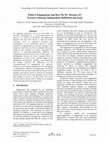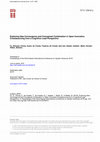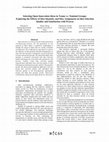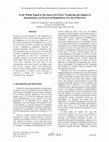Papers by Triparna de Vreede
Proceedings of the ... Annual Hawaii International Conference on System Sciences, 2018
Proceedings of the ... Annual Hawaii International Conference on System Sciences, 2017
Group Decision and Negotiation

Information Systems Research
Consumers read online reviews to decide whether to buy a product. Extensive research examines wha... more Consumers read online reviews to decide whether to buy a product. Extensive research examines what makes a single review helpful or credible, yet there is very limited understanding of how a collection of reviews facilitates purchase decisions. Such understanding is critical because consumers rarely consult all reviews or a single review. They often start by reading the “top reviews” that a website highlights, then deciding whether to read additional reviews and how many. This paper investigates how inconsistency among top reviews affects a consumer’s purchase deferral—the likelihood to decide immediately or defer the decision until after obtaining more information. We found that, if different reviewers disagree on their opinions about the same feature of a product, consumers are more likely to defer the purchase decision and consult more reviews. Further, this effect is weaker when reviewers provide specific details about their needs or use of the product along with their opinions....

Proceedings of the Annual Hawaii International Conference on System Sciences
An engaging experience draws in and holds our attention. Engagement is a critical phenomenon of i... more An engaging experience draws in and holds our attention. Engagement is a critical phenomenon of interest in a variety of disciplines and application domains and has been shown to lead to positive outcomes, such as enhanced learning, task performance, or job satisfaction. However, existing measures of engagement are typically specific to the domain in which the research is conducted. This paper builds on the synergies of various disciplines and proposes a discipline-independent definition of engagement and measurement scale. In this paper, we distinguished between the three temporal levels of engagement in terms of the expected length of the engagement (task/activity, initiative, and continuous). We further explored the differences in the conceptualization of engagement, viz. affective, behavioral, and cognitive engagement. We then offered a comprehensive definition of engagement. We finally developed a measurement scale that can be used across domains and contexts which we derived by iteratively refining the items in this scale through a series of five data samples to arrive at the final scale. Our results provide evidence for the scale's validity in two domains (online learning and work engagement).

Proceedings of the Annual Hawaii International Conference on System Sciences
Open innovative crowdsourcing has received increasing attention. This study sets out to investiga... more Open innovative crowdsourcing has received increasing attention. This study sets out to investigate idea convergence and generation in open innovative crowdsourcing communities from a cognitive load perspective to explore aspects of cognitive idea processing. We have conducted a laboratory experiment to investigate the effects of three manipulations (task complexity, idea presentation, and procedural guidance) on three types of cognitive load and the following idea convergence and generation quality. We have also examined the influencing mechanisms of cognitive loads on satisfaction with process and satisfaction with outcome. Our results show that the three cognitive loads have significant effects: Higher intrinsic cognitive load significantly leads to lower satisfaction with process and outcome. Higher extraneous cognitive load significantly leads to satisfaction with process. Higher germane cognitive load significantly leads to higher convergence quality and lower new idea generation quality.
Sustainability, Mar 24, 2022
This article is an open access article distributed under the terms and conditions of the Creative... more This article is an open access article distributed under the terms and conditions of the Creative Commons Attribution (CC BY

This paper focuses on inconsistency among a set of reviews and explores how, why, and when the pr... more This paper focuses on inconsistency among a set of reviews and explores how, why, and when the presence of cross-review incoherence influences consumers’ purchase deferral—their likelihood of making a “buy/not buy” decision immediately after consulting the reviews or deferring it until after obtaining more information. Based on the cognitive dissonance theory, we hypothesize that (a) the presence of cross-review incoherence or attribute-level contradictions among a set of reviews leads to lower certainty in consumer attitudes and a higher likelihood of purchase deferral, (b) this effect transpires through consumers’ helpfulness and credibility evaluations of the review set, and (c) the effect of cross-review incoherence on review set evaluations is weakened when the specificity of the context behind reviewers’ opinions is high. We conducted two experiments and found support for these predictions
Page 1. HICSS-45 TRACKS AND MINITRACKS Collaboration Systems and Technologies Track Jay Nunamaker... more Page 1. HICSS-45 TRACKS AND MINITRACKS Collaboration Systems and Technologies Track Jay Nunamaker Jr., University of Arizona Robert O. Briggs, San Diego State University Advances in Teaching and Learning Technologies David Spencer and Eric Santanen Cognitive Perspectives on Collaboration Gwendolyn L. Kolfschoten and Bruce Reinig Collaborative Modeling Stijn Hoppenbrouwers, Etiënne Rouwette, and Peter Rittgen Creativity ...
Proceedings of the Annual Hawaii International Conference on System Sciences, 2021
Proceedings of the Annual Hawaii International Conference on System Sciences, 2022
Proceedings of the Annual Hawaii International Conference on System Sciences, 2022
Proceedings of the Annual Hawaii International Conference on System Sciences, 2020

Proceedings of the Annual Hawaii International Conference on System Sciences, 2022
Idea selection is a critical activity in open innovation crowdsourcing projects. Yet, the generat... more Idea selection is a critical activity in open innovation crowdsourcing projects. Yet, the generation of vast amounts of ideas makes it cognitively challenging to identify the subset of ideas that are worthy of further consideration. We conducted an experiment to explore the influence of idea quantity and idea homogeneity on idea selection outcomes evaluated by crowds in the form of teams and nominal groups. We found that higher idea quantity is positively associated with idea selection quality and negatively associated with satisfaction with process. Further, team idea selection quality outperformed individual idea selection quality in both homogeneous information groups and low idea quantity groups. We did not find significant differences between group idea selection quality and individual idea selection quality in the heterogeneous information groups and high idea quantity groups. Theoretical contributions and practical implications are discussed.

Proceedings of the Annual Hawaii International Conference on System Sciences, 2019
Despite a growing literature on the helpfulness of individual reviews, scant attention has been p... more Despite a growing literature on the helpfulness of individual reviews, scant attention has been paid to the helpfulness of a set of reviews. Moreover, it is generally assumed that the helpfulness of a review set can be derived from averaging the individual reviews' helpfulness evaluations. Drawing on bounded rationality theories, we hypothesize that this assumption may not always be valid, and that consumers' helpfulness perception of a review set is also determined by inter-review consistency. A carefully designed experiment revealed that the whole differs from the sum of its parts when the reviews are consistent with each other or are contradicting each other, but does not differ when the reviews contain mixed, non-contradicting opinions. These findings deepen our understanding of inconsistency in online reviews and have a potential to change how reviews should be presented to the consumers.
Proceedings of the Annual Hawaii International Conference on System Sciences, 2021
Community crowdsourcing is a relatively new phenomenon where local institutions, such as cities a... more Community crowdsourcing is a relatively new phenomenon where local institutions, such as cities and neighborhoods, invite citizens to engage in a public discussion and solve problems that directly affect them. While community crowdsourcing has been around for over a decade, relatively little is known about what drives the success of these initiatives. In this exploratory study, we analyze field data from over 1,000 community crowdsourcing projects that were hosted on a professional community crowdsourcing platform. Our exploration reveals interesting insights into characteristics of community crowdsourcing projects that are associated with higher levels of user engagement. These insights allow us to speculate on guidelines to organize and execute community crowdsourcing initiatives.
Proceedings of the 51st Hawaii International Conference on System Sciences, 2018











Uploads
Papers by Triparna de Vreede